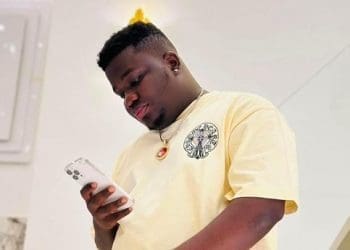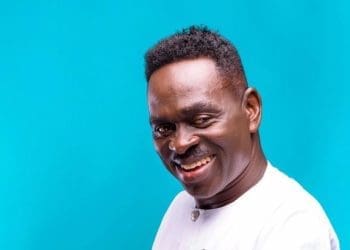A sea of candlelight, song, and sorrow flooded Accra’s Independence Square on the night of August 2, 2025, as thousands of Ghanaians gathered for a solemn vigil in memory of Charles Kwadwo Fosu, known to generations as Daddy Lumba.
The emotionally charged tribute to Ghana’s most beloved musical icon was a poignant celebration of a life that deeply shaped the nation’s cultural identity.
Clad in black and red, mourners filled the square with the sound of his timeless hits—from Aben Wo Ha to Yentie Obiaa—sung in unison as tears rolled down their cheeks.
His face, beaming across giant digital screens, watched silently over a grieving nation that had made his music the soundtrack of its collective life.
The event drew a mammoth crowd: fans, young and old, fellow musicians, political leaders, clergy, and dignitaries—all united in their shared sorrow and admiration.
Candle flames flickered against the night sky, illuminating tear-streaked faces and echoing a national pain too deep for words.
Artistic tributes and heartfelt stories
Throughout the night, the vigil became both a memorial and a celebration.
Tributes poured in through poetry recitals, gospel choirs, highlife band performances, and spontaneous renditions of Lumba’s greatest hits.
His songs—many of which reflected the complexities of love, betrayal, joy, and spirituality—were not just played; they were lived.
Fans shared personal stories, recalling how Lumba’s music helped them navigate heartbreaks, weddings, funerals, and life’s crossroads.
The emotional weight was palpable, and for many, it felt like losing a lifelong friend.
The vigil was the first in a series of commemorative events planned to honour the man whose voice became Ghana’s emotional compass.
National grief and official tributes
The vigil came just days after news broke on Saturday, July 26, 2025, that Daddy Lumba had died at the age of 60.
Ghana was instantly plunged into mourning.
From the highest offices of state to rural towns and roadside drinking spots, his voice filled the airwaves. Radios looped his songs.
Trotros turned into mobile shrines. And on social media, hashtags like #RestInPeaceLumba and #LumbaLivesOn trended nonstop.
The Ministry of Tourism, Arts and Culture was among the first institutions to respond.
In a statement, it described the loss as “a devastating blow to Ghana’s cultural heritage.”
It hailed Lumba as “a cultural force” whose unique lyrical style and unforgettable melodies elevated highlife to global prominence.
“His music transcended generations, and his contributions will forever be etched in our national consciousness,” the statement read. “May his soul rest in perfect peace.”
The Ministry revealed that its leadership, on behalf of President John Dramani Mahama, had already visited the late musician’s family to offer official condolences. “It was a solemn moment of national reflection,” the statement added.
Presidents and political leaders pay homage
President John Dramani Mahama led the nation in grief, calling Lumba “a Ghanaian music legend whose work provided the soundtrack to our lives.”
In his heartfelt tribute, Mahama wrote: “The beats may have died down, but his legacy will echo through the ages.”
Former President Nana Addo Dankwa Akufo-Addo, in his tribute, described Lumba as “a pantheon among musical greats” and “a dear friend whose hit-making prowess contributed to my political journey.”
He added, “May he rest in the bosom of the Almighty until the Last Day of Resurrection.”
Dr. Mahamudu Bawumia, former Vice-President, called Lumba “a pillar of the highlife genre” and commended him for nurturing and introducing many rising talents.
“His compositions inspired and uplifted us. His passing is a huge blow to the whole country,” Bawumia said.
The nation grieves loudly and proudly
Across the country, the outpouring of grief has been deafening. In Accra, Kumasi, Takoradi, Tamale, and smaller towns alike, his music echoes from every corner.
Food vendors, barbershops, hair salons, and markets have all become hubs of remembrance, playing back-to-back Lumba tracks.
Some fans broke down in tears on hearing the news. Others danced solemnly, holding radios close to their hearts.
Online, fans are posting old concert videos, rare interviews, and their favourite lyrics.
Lumba’s passing has united Ghana in a rare moment of national cultural mourning. He didn’t just make music; he made memory.
Family confirms passing, requests privacy
In a statement, the Fosu family confirmed Daddy Lumba’s death and appealed for privacy.
His radio station, DL FM, described his passing as “a dark day for Ghanaian music.”
“Daddy Lumba was more than a musician. He was a national treasure whose music captured the Ghanaian experience—its joys, sorrows, loves, and losses,” the station said.
The genius behind the voice
Born on September 29, 1964, in Nsuta-Amangoase in the Ashanti Region, Lumba’s career began in earnest with the 1989 release of Yereye Aka Akwantuo Mu.
Over the next 36 years, he released over 200 songs across 33 albums—more than most musicians achieve in a lifetime.
His genius lay in his contradictions. One year, he would release a gospel hit like Mesom Jesus.
Next, he would scandalise conservative audiences with provocative bangers like Aben Wo Ha.
He was both spiritual and sensual, moral and mischievous.
That duality endeared him to a vast audience.
For the pious, the romantic, the political, and the playful, there was always a Lumba song to match the moment.
Honours, awards, and international fame
Daddy Lumba won nearly every major music award in Ghana.
At the first Ghana Music Awards in 2000, he swept Artist of the Year, Album of the Year, and Most Popular Song.
He repeated similar feats in 2003 and 2015.
In 2008, the state awarded him a National Honours medal, and in 2017, he won Best Highlife Artiste at the Ghana Music Awards UK.
His Lifetime Achievement Award came the following year.
He was nominated for KORA, MOBO, and MTV Africa Music Awards—proof of his global impact.
In 2018, the EMY Africa Awards named him Entertainment Legend of the Year.
Our stories in his songs
Lumba’s discography reads like a social history of Ghana. His songs chronicled love, politics, family, betrayal, religion, wealth, and urban life.
With poetic flair, he gave voice to what Ghanaians were thinking but dared not say.
His collaborations with the likes of Nana Acheampong, Ofori Amponsah, Borax, and Afua Ampofowaa birthed anthems that defined decades.
Each project—Sika Asem, Awosoo, Poison, Agenda—captured the heartbeat of the nation at different points in time.
The final verdict: The GOAT
With his unmatched consistency, lyrical brilliance, genre-defining impact, and cultural relevance, the debate has largely ended: Daddy Lumba is the Greatest of All Time.
He was not just a musician; he was a master storyteller, an emotional therapist, a political influencer, and a cultural prophet.
As Ghana prepares to lay him to rest, one truth resonates across the country: Lumba is gone, but his music will never die.
Eternal echoes: His music lives on
Whether through a young lover dancing at a wedding, a lonely soul nursing heartbreak, or a hopeful singer inspired by his voice, Lumba will remain a fixture in Ghana’s emotional landscape.
In our radios, playlists, memories, and hearts, his music lives on.














